European Championship 2024 host cities - 10 German cities
Discover the European Championship 2024 host cities in Germany with this guide. View the sights and cultural heritage of the host cities for the European Football Championship on this page. Check the locations and plan your trip to the cities of EURO 2024.
Table of contents [hide]
? min. reading time | ? wordsGermany's European Championship 2024 host cities are spread across the country. The cities will warmly welcome the football fans during the event and provide them with lots of beer and bradwürst.
10 European Championship 2024 host cities
The 10 host cities in Germany during the European Championship 2024 are: []
- Berlin
- Cologne
- Dortmund
- Dusseldorf
- Frankfurt
- Gelsenkirchen
- Hamburg
- Leipzig
- Munich
- Stuttgart
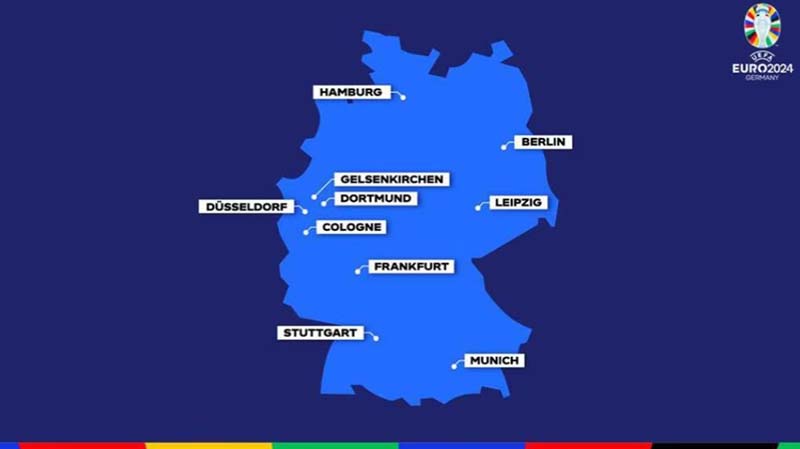
Three clusters of host cities
For the first time, sustainability is a criterion in the tournament's terms. That is why the organization has divided the schedule into three clusters:
- North: Berlin, Hamburg and Leipzig
- West: Dortmund, Düsseldorf, Frankfurt, Gelsenkirchen and Cologne
- South: Frankfurt, Munich and Stuttgart
The matches from a group will be played within two clusters, so that the travel distances remain limited. Players and fans can easily travel between cities via train or bus.
Base camps for the national teams during the European Football Championship
All 20 qualified teams for the final tournament and host nation Germany have confirmed their team base camps. From there they will travel to their respective matches and stay between matches during the tournament.
Host nation Germany have announced they will stay in Herzogenaurach in Bavaria, title holders Italy have chosen Iserlohn in North Rhine-Westphalia and European Championship 2020 finalists England have chosen Blankenhain in Thuringia. All teams will check into their base camps at least five days before their first match, hoping to extend their stay in their "second home" until the finals.
For the first time, sustainability has been included as a criterion in the tournament rules, and the match schedule has been designed so that teams only play their group matches in two regional clusters to reduce travel distances for teams and fans between the host cities. This benefits the team delegations who travel by train or bus from their base camp to the match venues during the group stage, resulting in a much smaller carbon footprint than in previous tournaments.
These are the teams' base camps:
| Team | Base camp |
|---|---|
| Albania | Came |
| Belgium | Ludwigsburg |
| Denmark | Freudenstadt |
| Germany | Herzogenaurach |
| England | Blankenhain |
| France | Paderborn |
| Hungary | Hamlet in the Allgäu |
| Italy | Iserlohn |
| Croatia | Neuruppin |
| The Netherlands | Wolfsburg |
| Austria | Berlin |
| Portugal | Harsewinkel |
| Romania | Würzburg |
| Scotland | Garmisch-Partenkirchen |
| Serbia | Augsburg |
| Slovenia | Wuppertal |
| Slovakia | Mainz |
| Spain | Donaueschingen |
| Czech Republic | Norderstedt |
| Turkey | Barsinghausen |
| Switzerland | Stuttgart |
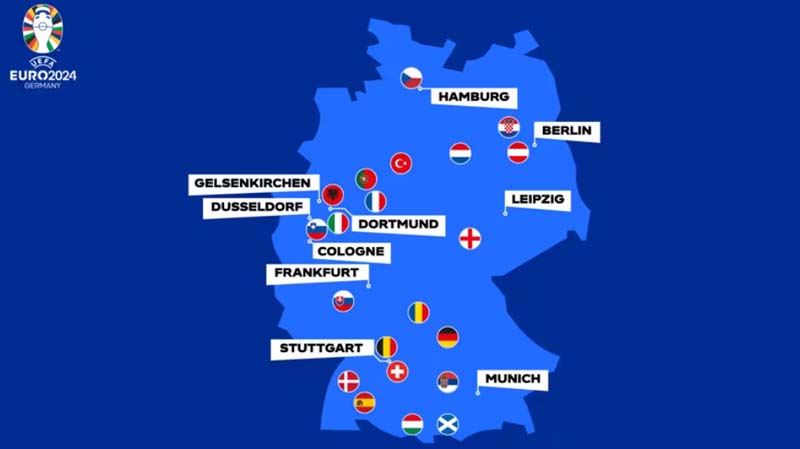
Fan zones
Fans are at the center of the organization of the European Football Championship in 2024. All host cities already have a lot of experience with major sporting events and during the European Championship 2024 the cities will do even more for football fans. Because the average capacity of 50,000 seats per stadium will not be enough to accommodate all supporters, special fan zones will be set up.
The average capacity of the fan zones is between 33,000 and 80,000 supporters. Fans without a ticket can also watch the matches en masse here.
In each host city, a maximum of three squares will be set up as fan zones, where fans from all countries will party before, during and after the matches. The cities are therefore known for their pleasant squares with many terraces and restaurants. Germany takes the safety around these zones very seriously.
Travel to Germany
The distances between the host cities in Germany are relatively small and most kilometers can easily be done by car or train.
| Distances | Berlin | Cologne | Dortmund | Dusseldorf | Frankfurt | Gelsenkirchen | Hamburg | Leipzig | Munich | Stuttgart |
|---|---|---|---|---|---|---|---|---|---|---|
| Berlin | x | 578 | 496 | 559 | 553 | 521 | 293 | 191 | 585 | 636 |
| Cologne | 578 | x | 97 | 38 | 190 | 84 | 426 | 506 | 575 | 372 |
| Dortmund | 496 | 97 | x | 72 | 224 | 36 | 346 | 419 | 607 | 424 |
| Dusseldorf | 559 | 38 | 72 | x | 226 | 51 | 409 | 485 | 611 | 407 |
| Frankfurt | 553 | 190 | 224 | 226 | x | 255 | 496 | 388 | 393 | 209 |
| Gelsenkirchen | 521 | 84 | 36 | 51 | 255 | x | 356 | 462 | 636 | 442 |
| Hamburg | 293 | 426 | 346 | 409 | 496 | 356 | x | 394 | 776 | 656 |
| Leipzig | 191 | 506 | 419 | 485 | 388 | 462 | 394 | x | 432 | 472 |
| Munich | 585 | 575 | 607 | 611 | 393 | 636 | 776 | 432 | x | 232 |
| Stuttgart | 636 | 372 | 424 | 407 | 209 | 442 | 656 | 472 | 232 | x |
The slogan to bring in the organization of the tournament was 'United by football. In the heart of Europe'. Germany is indeed very central to the European continent and is well connected to neighboring countries. Large cities such as Amsterdam, Brussels, Copenhagen, Luxembourg, Paris, Prague, Vienna, Warsaw and Zurich are very easily accessible by road and rail.
Almost the entire European population lives within 2,000km of the host country and approximately 360 million people live within 1,000km. With 16 international airports, Germany is the perfect location to host a major UEFA football tournament. The Deutsche Bahn has a direct train connection with 12 countries, enabling 230 million Europeans to reach one of the 10 host cities within 6 hours.
The host cities all have an international airport nearby (6 to 43 minutes travel). Each city also has an alternative airport within 1.5 hours of travel.
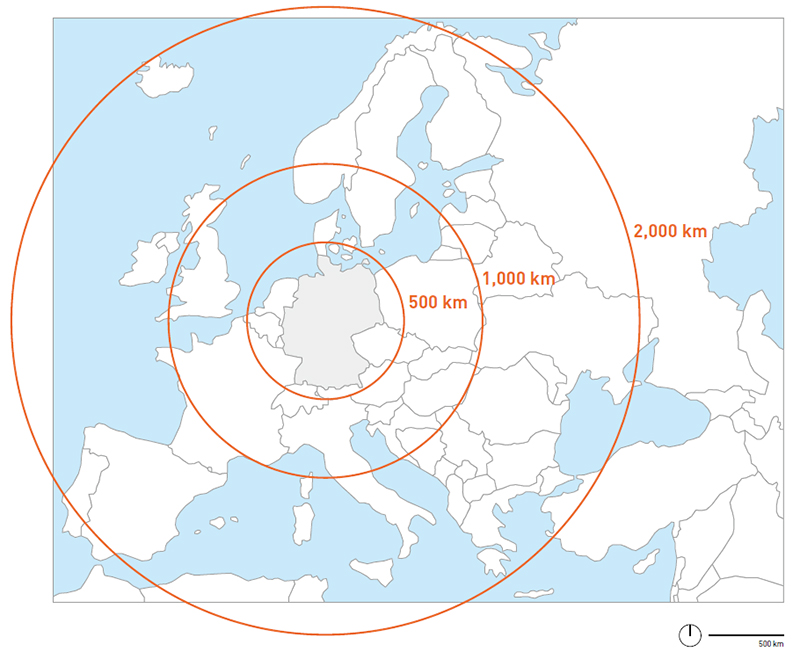
Travel within Germany
Traveling within Germany is easy with more than 13,000 km of roads and 33,000 km of rail tracks. As a supporter of one of the 24 participating countries, you can enjoy comfortable, fast, ecological and trusted transport between the cities. All host cities are directly connected by train and the capacity is expanded during the football tournament.
The infrastructure in the various host cities is also very good and does not require major investments. Every city has a lot of experience in transporting thousands of people, because football matches in the cities are sold out almost every weekend. The cities have already proven that they can easily handle the large crowds during rush hour with 75,000 football fans.
All EURO 2024 stadiums in the cities have:
- public transport and train stations nearby;
- connection to multiple modes of transport (train, metro, tram and bus);
- accessibility for disabled people;
- enough parking for VIPs (even the traffic can be arranged);
- direct access to the highways;
- pedestrian and bicycle paths to and from the stadium;
- good signposts and information boards.
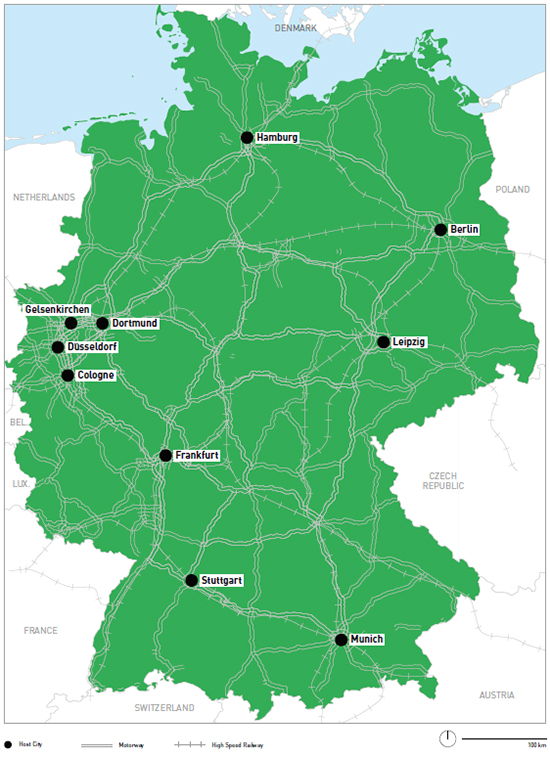
Who are the ambassadors of the European Championship host cities?
Ambassadors of the European Championship host cities are:
- Berlin: Kevin-Prince Boateng
- Cologne: Harald Schumacher
- Dortmund: Roman Weidenfeller, Annike Krahn
- Duesseldorf: Martina Voss-Tecklenburg, Sandra Mikolaschek, Selin Oruz
- Frankfurt: Alex Meier, Deborah Levi
- Gelsenkirchen: Gerald Asamoah
- Hamburg: Patrick Esume
- Leipzig: Professor Dr Jörg Junhold, Anja Mittag, Jürgen Zielinski
- Munich: Dr Felix Brych
- Stuttgart: Cacau, Niko Kappel, Eli Seitz
Host city Berlin
Berlin has been the capital of Germany since unification in 1990. The city is one of the most challenging and diverse places to visit. Nice tourist attractions are the Brandenburg Gate and the TV tower of 368 meters high. Play city Berlin has many historic buildings that you must see as a football fan.
Berlin is home to the Olympiastadion Berlin with a capacity of 70,033 seats. In 2006 the World Cup final was played here and in 2015 the final of the Champions League.
Berlin schedule EURO 2024
This is the schedule in Berlin at EURO 2024.
| #3) Sat 15 Jun 17:00 | Group B | Olympiastadion | ||
| Spain | 3-0 | Croatia | ||
| #19) Fri 21 Jun 17:00 | Group D | Olympiastadion | ||
| Poland | 1-3 | Austria | ||
| #31) Tue 25 Jun 17:00 | Group D | Olympiastadion | ||
| Netherlands | 2-3 | Austria | ||
| #38) Sat 29 Jun 17:00 | 1/8 final | Olympiastadion | ||
| Switzerland | 2-0 | Italy | ||
| #47) Sat 06 Jul 20:00 | 1/4 final | Olympiastadion | ||
| Netherlands | 2-1 | Turkey | ||
| #51) Sun 14 Jul 20:00 | final | Olympiastadion | ||
| Spain | 2-1 | England | ||
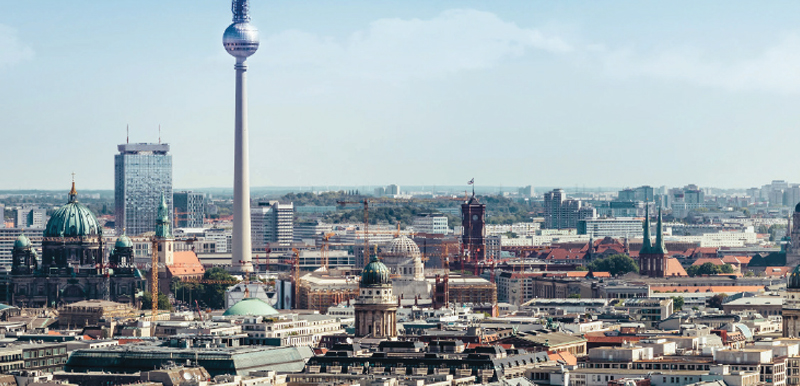
Host city Dortmund
Dortmund is considered the cultural heart of the Ruhr area. The host city is historically known for coal, steel and beer, but has developed as a tech city. The host city has a vibrant cultural scene and rich sporting history.
Dortmund has the Signal Iduna Park Stadium with a capacity of 61,524 seats. The 2001 UEFA Cup Final was played here.
Dortmund schedule EURO 2024
This is the schedule in Dortmund at EURO 2024.
| #4) Sat 15 Jun 20:00 | Group B | BVB Stadion | ||
| Italy | 2-1 | Albania | ||
| #11) Tue 18 Jun 17:00 | Group F | BVB Stadion | ||
| Turkey | 3-1 | Georgia | ||
| #23) Sat 22 Jun 17:00 | Group F | BVB Stadion | ||
| Turkey | 0-3 | Portugal | ||
| #32) Tue 25 Jun 17:00 | Group D | BVB Stadion | ||
| France | 1-1 | Poland | ||
| #37) Sat 29 Jun 20:00 | 1/8 final | BVB Stadion | ||
| Germany | 2-0 | Denmark | ||
| #50) Wed 10 Jul 20:00 | 1/2 final | BVB Stadion | ||
| Netherlands | 1-2 | England | ||
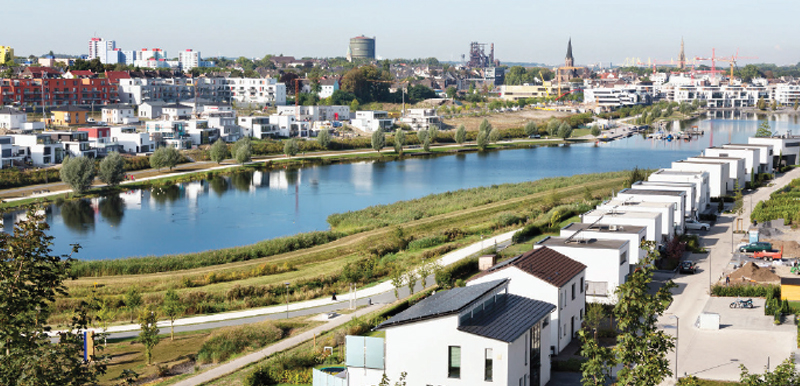
Host city Düsseldorf
Host city Düsseldorf is the capital of the North Rhine-Westphalia area and has 650,000 inhabitants. For the real football fan, there are over 250 beer houses and restaurants in the old town. It is said that Düsseldorf has the longest bar in the world.
The Esprit Arena in Düsseldorf has a capacity of 46,264 seats. In 1988, the group matches of the European Championship were played in this stadium.
Düsseldorf schedule EURO 2024
This is the schedule in Düsseldorf at EURO 2024.
| #8) Mon 17 Jun 20:00 | Group D | Dusseldorf Arena | ||
| Austria | 0-1 | France | ||
| #21) Fri 21 Jun 14:00 | Group E | Dusseldorf Arena | ||
| Slovakia | 1-2 | Ukraine | ||
| #27) Mon 24 Jun 20:00 | Group B | Dusseldorf Arena | ||
| Albania | 0-1 | Spain | ||
| #42) Mon 01 Jul 17:00 | 1/8 final | Dusseldorf Arena | ||
| France | 1-0 | Belgium | ||
| #48) Sat 06 Jul 17:00 | 1/4 final | Dusseldorf Arena | ||
| England | 1-1 | Switzerland | ||
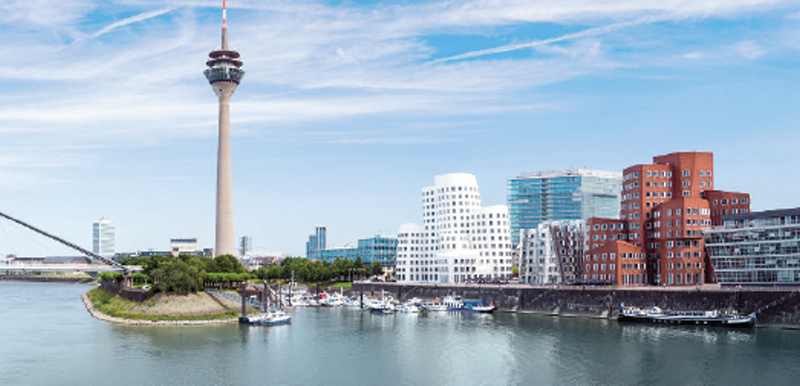
Host city Frankfurt
Frankfurt is Germany's fifth largest city and is a hub for commercial and financial services. The host city is located on the banks of the river Main, which is why the city has the nickname 'Mainhatten'.
In Frankfurt is the Commerzbank Arena with a capacity of 48,057 seats. The 2002 UEFA Woman's Cup Final and the 2006 World Cup quarter-final were played here.
Frankfurt schedule EURO 2024
This is the schedule in Frankfurt at EURO 2024.
| #9) Mon 17 Jun 17:00 | Group E | Frankfurt Arena | ||
| Belgium | 0-1 | Slovakia | ||
| #17) Thu 20 Jun 17:00 | Group C | Frankfurt Arena | ||
| Denmark | 1-1 | England | ||
| #25) Sun 23 Jun 20:00 | Group A | Frankfurt Arena | ||
| Switzerland | 1-1 | Germany | ||
| #33) Wed 26 Jun 17:00 | Group E | Frankfurt Arena | ||
| Slovakia | 1-1 | Romania | ||
| #41) Mon 01 Jul 20:00 | 1/8 final | Frankfurt Arena | ||
| Portugal | 0-0 | Slovenia | ||
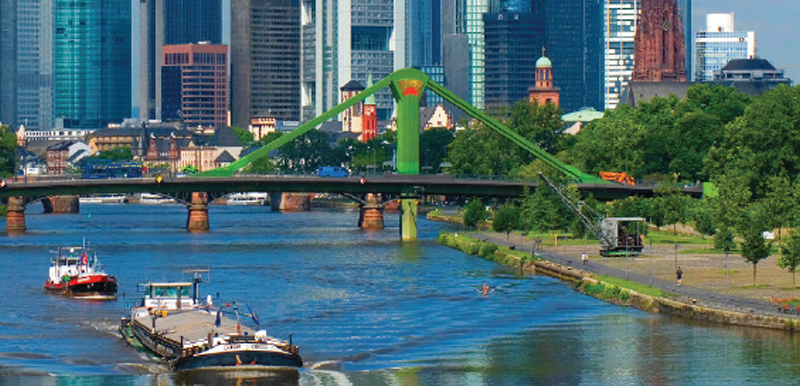
Host city Gelsenkirchen
Gelsenkirchen is known for its coal mines and steel industry, but football supporters during the European Championship 2024 will mainly find a lot of green. They can also visit theaters and boat cruises in this host city in the Ruhr area.
In Frankfurt is the Commerzbank Arena with a capacity of 49,471 seats. The 2004 Champions League final and the 2006 World Cup quarter-final were played here.
Gelsenkirchen schedule EURO 2024
This is the schedule in Gelsenkirchen at EURO 2024.
| #5) Sun 16 Jun 20:00 | Group C | Arena AufSchalke | ||
| Serbia | 0-1 | England | ||
| #16) Thu 20 Jun 20:00 | Group B | Arena AufSchalke | ||
| Spain | 1-0 | Italy | ||
| #35) Wed 26 Jun 20:00 | Group F | Arena AufSchalke | ||
| Georgia | 2-0 | Portugal | ||
| #40) Sun 30 Jun 17:00 | 1/8 final | Arena AufSchalke | ||
| England | 2-1 | Slovakia | ||
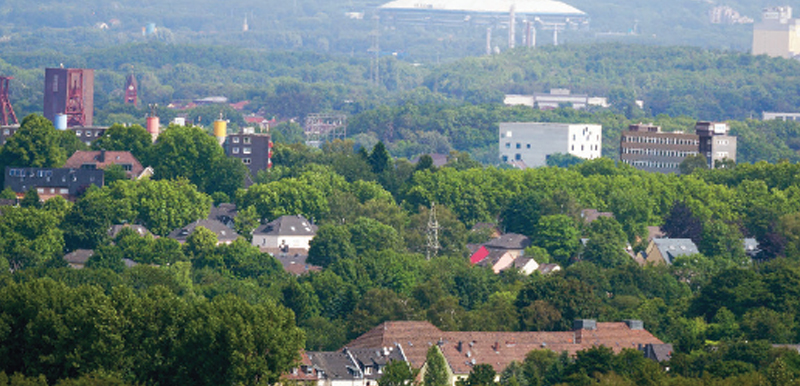
Host city Hamburg
European Championship host city Hamburg is the third largest city in Europe that is not a national capital. The city has a world-famous port, a rich cultural history, imposing architecture and a lively nightlife. This makes Hamburg a city to visit as a football fan.
In Hamburg is the Volkspark Stadion with a capacity of 50,215 seats. The Europa League final was played here in 2010 and the World Cup quarter-final in 2006.
Hamburg schedule EURO 2024
This is the schedule in Hamburg at EURO 2024.
| #7) Sun 16 Jun 14:00 | Group D | Volksparkstadion | ||
| Poland | 1-2 | Netherlands | ||
| #15) Wed 19 Jun 14:00 | Group B | Volksparkstadion | ||
| Croatia | 2-2 | Albania | ||
| #24) Sat 22 Jun 14:00 | Group F | Volksparkstadion | ||
| Georgia | 1-1 | Czech Republic | ||
| #36) Wed 26 Jun 20:00 | Group F | Volksparkstadion | ||
| Czech Republic | 1-2 | Turkey | ||
| #46) Fri 05 Jul 20:00 | 1/4 final | Volksparkstadion | ||
| Portugal | 0-0 | France | ||
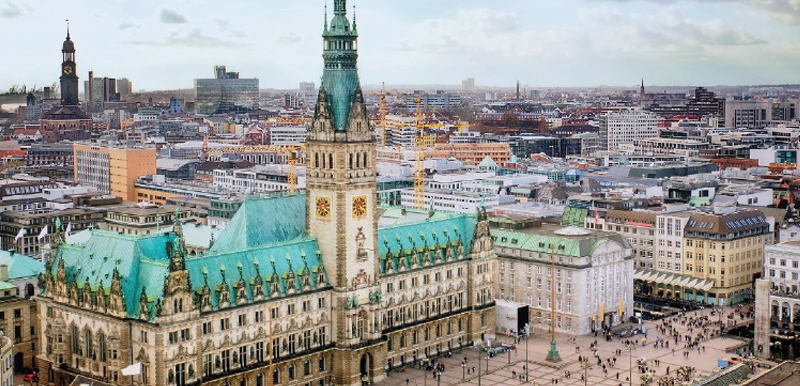
Host city Cologne
Cologne is a city with a rich history. The host city is located on the river Rhine and has more than a million inhabitants. The most visited monument in Germany is located in this city, namely the Cathedral of Saint Peter.
Cologne is home to the RheinEnergie Stadium with a capacity of 46,922 seats. In 2020, the final of the Europa League was played here.
Cologne schedule EURO 2024
This is the schedule in Cologne at EURO 2024.
| #2) Sat 15 Jun 14:00 | Group A | Cologne Stadion | ||
| Hungary | 1-3 | Switzerland | ||
| #13) Wed 19 Jun 20:00 | Group A | Cologne Stadion | ||
| Scotland | 1-1 | Switzerland | ||
| #22) Sat 22 Jun 20:00 | Group E | Cologne Stadion | ||
| Belgium | 2-0 | Romania | ||
| #29) Tue 25 Jun 20:00 | Group C | Cologne Stadion | ||
| England | 0-0 | Slovenia | ||
| #39) Sun 30 Jun 20:00 | 1/8 final | Cologne Stadion | ||
| Spain | 4-1 | Georgia | ||
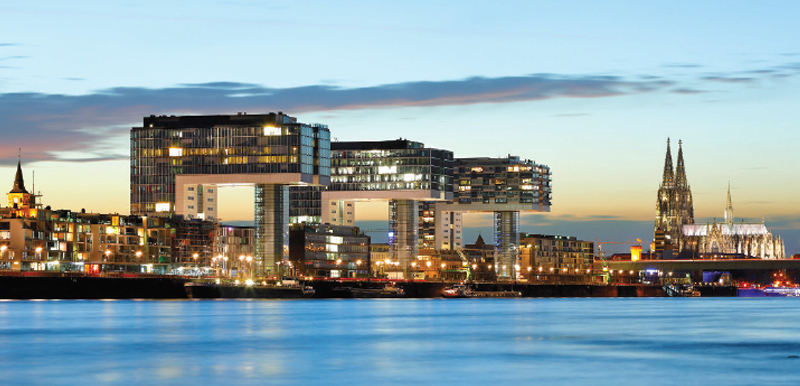
Host city Leipzig
Leipzig was once the home city of Johann Sebastian Bach, so the host city has a great cultural history. In 1989 there was a peaceful demonstration in this city for the merger of East and West Germany.
Leipzig has the Red Bull Arena with a capacity of 46,635 seats. Group matches and an eighth final of the 2006 World Cup were played in this stadium.
Leipzig schedule EURO 2024
This is the schedule in Leipzig at EURO 2024.
| #12) Tue 18 Jun 20:00 | Group F | Leipzig Stadion | ||
| Portugal | 2-1 | Czech Republic | ||
| #20) Fri 21 Jun 20:00 | Group D | Leipzig Stadion | ||
| Netherlands | 0-0 | France | ||
| #28) Mon 24 Jun 20:00 | Group B | Leipzig Stadion | ||
| Croatia | 1-1 | Italy | ||
| #44) Tue 02 Jul 20:00 | 1/8 final | Leipzig Stadion | ||
| Austria | 1-2 | Turkey | ||
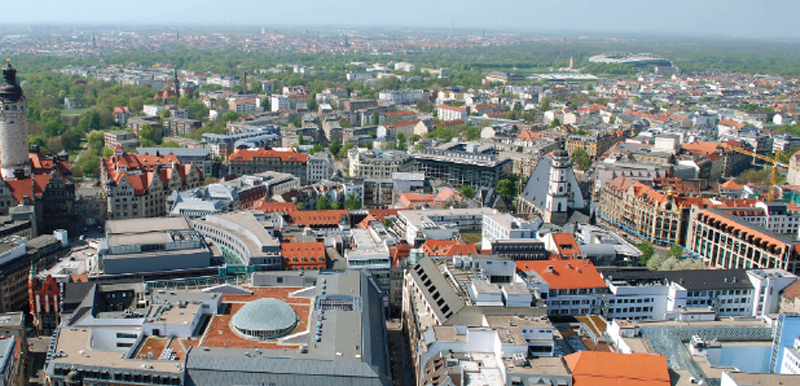
Host city Munich
Munich is home to 1.6 million people and is the third largest city in Germany. The host city has a rich art history, many beautiful parks and so-called 'beer gardens' for real football fans.
Munich is home to the Allianz Arena with a capacity of 66,026 seats. The city hosted the 2012 Champions League final and the quarter-finals of Euro 2020.
Munich schedule EURO 2024
This is the schedule in Munich at EURO 2024.
| #1) Fri 14 Jun 20:00 | Group A | Munich Football Arena | ||
| Germany | 5-1 | Scotland | ||
| #10) Mon 17 Jun 14:00 | Group E | Munich Football Arena | ||
| Romania | 3-0 | Ukraine | ||
| #18) Thu 20 Jun 14:00 | Group C | Munich Football Arena | ||
| Slovenia | 1-1 | Serbia | ||
| #30) Tue 25 Jun 20:00 | Group C | Munich Football Arena | ||
| Denmark | 0-0 | Serbia | ||
| #43) Tue 02 Jul 17:00 | 1/8 final | Munich Football Arena | ||
| Romania | 0-3 | Netherlands | ||
| #49) Tue 09 Jul 20:00 | 1/2 final | Munich Football Arena | ||
| Spain | 2-1 | France | ||
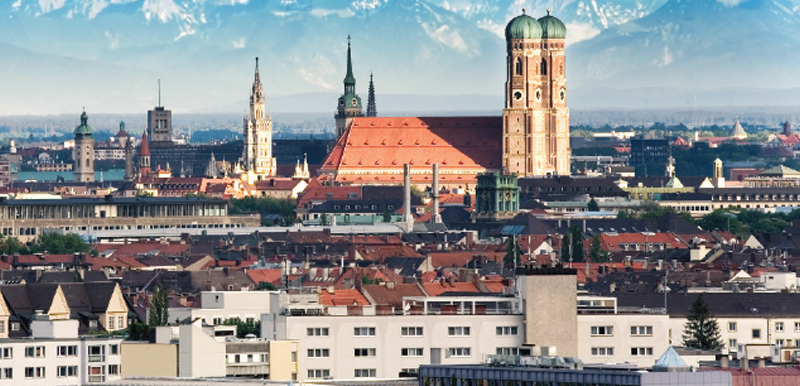
Host city of Stuttgart
Stuttgart is a large industrial city, including the origins of two well-known car manufacturers, Meredes and Porsche. Football fans can enjoy the various wineries and local culture in the host city.
In Stuttgart is the Mercedes-Benz Arena with a capacity of 50,998 seats. The European Cup final in 1998 and the consolation final of the 2006 World Cup were played in this stadium.
Stuttgart schedule EURO 2024
This is the schedule in Stuttgart at EURO 2024.
| #6) Sun 16 Jun 17:00 | Group C | Stuttgart Arena | ||
| Slovenia | 1-1 | Denmark | ||
| #14) Wed 19 Jun 17:00 | Group A | Stuttgart Arena | ||
| Germany | 2-0 | Hungary | ||
| #26) Sun 23 Jun 20:00 | Group A | Stuttgart Arena | ||
| Scotland | 0-1 | Hungary | ||
| #34) Wed 26 Jun 17:00 | Group E | Stuttgart Arena | ||
| Ukraine | 0-0 | Belgium | ||
| #45) Fri 05 Jul 17:00 | 1/4 final | Stuttgart Arena | ||
| Spain | 2-1 | Germany | ||
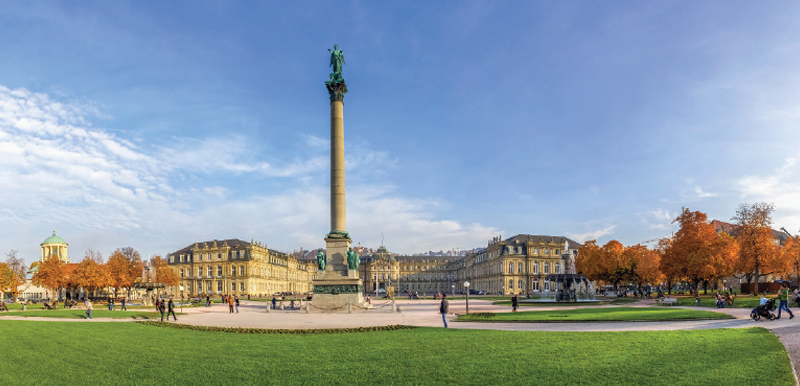
Frequently asked questions (FAQ) about the host cities
What are the host cities of the European Championship 2024?
The host cities of the European Championship 2024 are:
- Berlin
- Cologne
- Dortmund
- Dusseldorf
- Frankfurt
- Gelsenkirchen
- Hamburg
- Leipzig
- Munich
- Stuttgart
References
[hide]Share 'EURO 2024 host cities - Everything about the European Championship host cities'
Share this message via social media with your family, friends and colleagues!
EURO 2024 host cities in Germany. Find out everything about the European Championship host cities, such as the sights, locations and travel distances. Use this guide to plan your visit to the European Championship.
About the author of 'EURO 2024 host cities - Everything about the European Championship host cities'

Author of this content is Patrick. I have been playing soccer for more than 25 years and follow the daily news closely. My hobbies include playing football, running and maintaining various websites, in addition to my job as a financial professional.
I do not work for any related company or institution, so the information is reliable and independent. The information has been collected accurately from reliable sources and is regularly updated.
